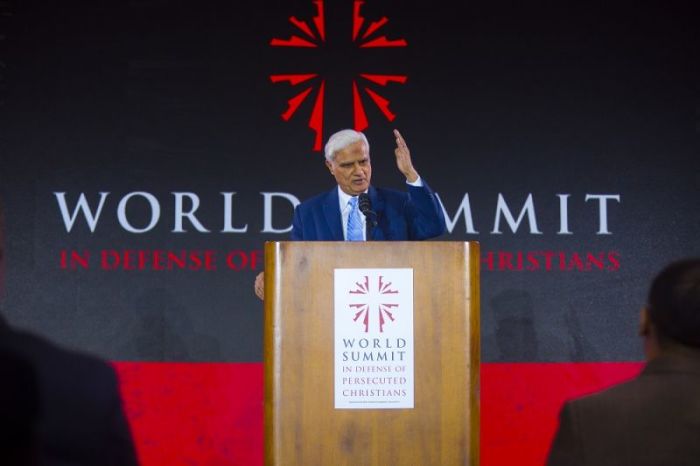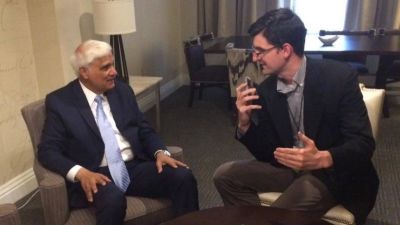Ravi Zacharias: Millennials Have 'Burned Themselves Out' Sexually, Are Hungering for Real Jesus

WASHINGTON – Millennials are rejecting what they think Christ is — a religious form devoid of the power to touch the soul, according to acclaimed Christian apologist Ravi Zacharias. Unfettered sexual expression has filled the void but has left them empty, he said.
In a speech Friday afternoon at the first-ever World Summit in Defense of Persecuted Christians, sponsored by the Billy Graham Evangelistic Association, before 600 advocates for the persecuted church and victims of persecution, the apologist exhorted those in attendance to dispense with a comfortable, "tepid Christianity" as a "scorching paganism" rises in the West. He recounted that today he is inspired to meet even 12- and 13-year-olds who tell him that they want to do what he does, vigorously defend the Gospel of Jesus Christ.
Following his remarks, Zacharias told The Christian Post in a sit-down interview that he and his colleagues were speaking at a state university in Michigan when a student stood up during Q&A and said that he used to be a Christian for 18 years but then walked away from his faith.
Although one of his colleagues answered that man's question that night, Zacharias tracked him down and ended up speaking to him by phone. He asked the young man if he had found answers to the questions that he wanted answers to but never got while a Christian and inquired whether he had found meaning and purpose in life by rejecting the Christian faith.
The young man said "no" to both questions.
"It is not that [millennials] are abandoning [Christianity] in favor of something else that is meeting their needs," Zacharias said. "They have come to the conclusion that there are no answers anywhere."
"And that's what we need to avoid."
Zacharias believes that if young people thought answers could be found in the Christian faith, and that the head and the heart can be bridged, they would give Christians a hearing. Yet what has also happened is that sexual expression has displaced real spirituality and has become "the supreme pursuit of fulfillment," he said.
"And what they have done is burned themselves out before they are even in their mid-20s and they have come away empty-handed as well."
Absent the spirit, he noted, one has nothing left but the body.
"And if the body indulges itself you're going to come away empty. It is only the touching of the soul that lifts you to perpetual novelty," he emphasized.
"The millennials have rejected what they think is Christ, but what they have actually rejected is a form of religious expression."

CP asked Zacharias if he considers the ideology of the Sexual Revolution the death knell of the Church, particularly since it is now so politically weaponized.
"It has become the point of explosive questioning in our time," he replied, noting that people bring up questions about sexuality no matter what topic he is speaking on, including unrelated matters such as the age of the earth.
What many fail to realize is that God's laws are actually liberating, not repressive, he said. And the challenge for Christians is to present sexuality in its beauty, not in its repressiveness.
"And beauty comes with boundaries and laws," he said, "and deep inside, people know the real battle. We don't have to tell it to them."
"What they really want to know is do you value them as a person, or do you just identify them as an opposition. When you value people as individuals even if they disagree with you they will get up and give you a hug and tell you 'thank you for taking the time to talk to me.'"
Zacharias came to Christ in a hospital room on what he calls a "bed of suicide" when he was 17 years old. He is a Christian today because someone cared enough to come and talk to him about Jesus and the same compassion he was once shown should inform the approach of Christians today, he said.
In his address to the summit, Zacharias mentioned how ironic it is that today in America, supposedly the land of the free, he has to have security present when he speaks on college campuses due to threats from atheist groups. Upon receiving such threats of violence recently he said he heard from a friend from Jakarta, Indonesia — the nation with the largest Muslim population in the world — who told him that he and fellow Christians there would be praying for him.
When asked what he sees coming in the next five years in light of the growing hostility to the Gospel across the United States, he joked that one of his professors used to say that prophecy is very difficult, "especially about the future."
Nevertheless, he offered that the United States is headed in a precarious direction.
"Because so much is mixed up, even in the realm of giving birth to babies, we will end up with a greater loss of identity in the next generation than possibly we have ever had," Zacharias said.
"So in looking for identity it may be the very thing we will lose in the process as technology supercedes moral reasoning. That may be the battle of the next generation; that may be the turning point when a generation has lost the very thing it pursued," he concluded.





























